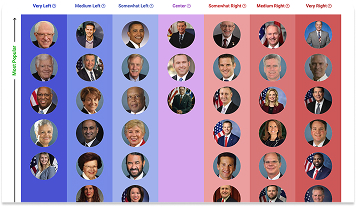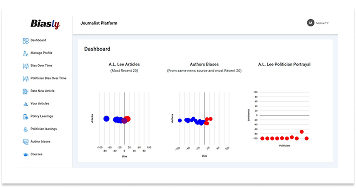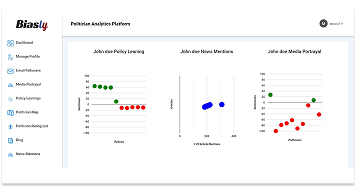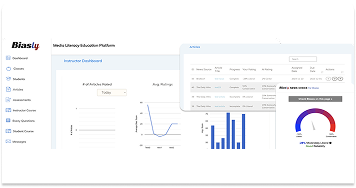Bias Meter
Extremely
Liberal
Very
Liberal
Somewhat Liberal
Center
Somewhat Conservative
Very
Conservative
Extremely
Conservative
-100%
Liberal
100%
Conservative

Biasly determines media bias ratings through a dual-layered approach combining artificial intelligence and analyst review. The platform’s proprietary bias detection engine, Bias Meter, evaluates sentiment, policy position alignment, and language framing across thousands of data points in news articles. Analysts then verify and interpret the AI’s findings, providing additional context where needed. Learn more
- Profile
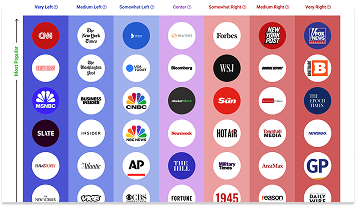
Newsweek on the media bias chart
Newsweek has a Bias Score of -4% Center which is based on a variety of factors including its policy and politician leanings, article ratings, and the use of biased language. Its Reliability is rated as Good, and additional analytical insights are available in the other tabs.
- Bias Rating
-4% Center
- ReliabilityPolicy Leanings
6% Center
Extremely
LiberalVery
LiberalModerately
LiberalSomewhat Liberal
Center
Somewhat Conservative
Moderately
ConservativeVery
ConservativeExtremely
Conservative-100%
Liberal100%
Conservative
Average Reliability
*Our bias meter rating uses data science including sentiment analysis, machine learning and our proprietary algorithm for determining biases in news articles. Bias scores are on a scale of -100% to 100% with higher negative scores being more liberal and higher positive scores being more conservative and 0% being neutral. The rating is an independent analysis and is not affiliated nor sponsored by the news source or any other organization.
Politician Portrayal74% negative
Continue For Free
Create your free account to see the in-depth bias analytics and more.
By creating an account, you agree to our Terms and Privacy Policy, and subscribe to email updates.
Log In
Log in to your account to see the in-depth bias analytics and more.
Policy Leanings Analysis
Policy | Bias score |
|---|
Newsweek’s Editorial Patterns
Newsweek’s coverage of political topics often reflects a Center bias, with consistent patterns in phrasing, source selection, and thematic focus that lean center. While the publication demonstrates journalistic standards in many of its reports, the choice of issues, framing, and word usage can indicate a slight political slant. This slant sometimes leans left and sometimes leans right. This content analysis examines how Newsweek handles both liberal and conservative issues and evaluates its language choices and editorial tendencies.
Coverage of Liberal vs. Conservative Topics
Newsweek has been shown to cover topics with both left-leaning and right-leaning views. For instance, let’s take a look at the opinion piece “The Right Is Better at Communicating. What Progressives Should Learn From Ben Shapiro” on Newsweek’s website.
“For my money, it’s Bernie Sanders—not Ronald Reagan—who deserves the title of the ‘Great Communicator’ of American politics. Agree with him or not, Sanders is incredibly effective at delivering a clear, simple message that resonates with his audience.”
The author makes a deliberate effort to respect both sides in this article. This quotation very clearly articulates the author’s claim and reason for writing this opinion piece. Despite this, he is also transparent about his political views when he states,
“Unfortunately, Bernie’s clear and direct style of communication is the exception rather than the rule on the Left.”
The author does make his position as left-leaning purposefully transparent within the article. However, the author is also criticizing an issue within his side of the political divide rather than criticizing the Right. The following quote is another example of the author admitting that the Right does something broadly better than the Left.
“Lately I’ve been reading dozens upon dozens of right-wing books, by figures from Friedrich von Hayek to Tucker Carlson, as research for a book of refutations of conservative talking points. And one of the most striking, undeniable facts is that conservatives are far better writers than their Left-wing counterparts.”
This admission by the author that the opposite side of his own political beliefs is generally better at presenting their ideas in a well-written, digestible way shows that he is willing to concede that the Left can learn something from the Right when it comes to presenting their ideas. He also focuses on Bernie Sanders in particular as a Left-wing politician who excels in this department.
Policy and Issue Framing
The policy analysis of Newsweek has been labeled as Somewhat Right. When covering topics like Anti-discrimination laws and Border Asylum for Refugees, Newsweek leans to the conservative side. However, for issues like Abortion and Anti-Terrorism, Newsweek leans Somewhat Left. Yet for most topics, such as Affirmative Action, Border Control, the Border Wall, Deportations, and Black Lives Matter Politicization, Newsweek is rated as balanced and Center.
Newsweek carries a wide variety of articles from authors with varying biases. In addition to news articles like the previous ones discussed, Newsweek’s website also includes a page for opinion pieces. These pieces, which, as the name suggests, are meant to convey the opinion of the author rather than factual reporting.
Coverage and Relevance
Newsweek’s reporting often touches on relevant key issues central to the media’s political bias discussion. It covers a wide range of topics, not just in the U.S., but also across nations like the Middle East, Russia, Ukraine, Asia, and other regions.
Newsweek also covers lifestyle topics such as travel, health, parenting, science, pets, and relationships. Furthermore, it even provides an Opinion section with a range of viewpoints, providing different views on trending topics. Overall, Newsweek does provide extensive coverage of relevant issues around the world.
Newsweek Bias Analysis
Newsweek was initially founded in 1933 as a weekly news magazine in the same vein as Time. It has since become a major publication of both print and digital news, with around 100 million overall readers monthly. It is a long-running news magazine and website with an average of 40 million website views each month. This places it in the same league as other major publications’ websites, such as Politico and ABC News.
Is Newsweek Biased?
Based on Biasly’s evaluations, Newsweek is rated as Center.
By examining content patterns and the broader context of media influence, we aim to offer a balanced perspective on Newsweek’s political bias—and contribute to the ongoing discussion about bias in the news.
How Does Biasly Rate News Sources?
Biasly uses proprietary algorithms and a team of analysts to provide comprehensive bias evaluations across thousands of news outlets. Over 200,000 articles from more than 3,200 sources have been analyzed to identify the most accurate and unbiased stories.
Biasly assigns each outlet three key scores:
- Reliability Score – Reflects factual accuracy
- AI Bias Score – Generated via natural language processing
- Analyst Bias Score – Assessed by human political analysts
These scores are based on seven core metrics: Tone, Tendency, Diction, Author Check, Selection/Omission, Expediency Bias, and Accuracy. These elements help analysts and algorithms evaluate the political attitude conveyed by each article.
Biasly’s Bias Meter ranges from -100% (most left) to +100% (most right), with 0% indicating neutrality. The system evaluates individual articles based on political terms, policies, figures, and sentiment to calculate precise bias ratings.
Is Newsweek Politically Biased?
Newsweek earns a Center rating for both its AI Bias Score and Center for its Analyst Bias Score. Reviewers from liberal, moderate, and conservative backgrounds generate the Analyst Bias Score. Analysts reviewed 15 Newsweek articles and noted preferences in areas like coverage of liberal politicians and policy topics such as abortion rights and clean energy. However, the paper maintained objectivity on issues like education and national security.
Newsweek appears to exhibit some bias in its articles, yet balances this out by presenting opposing viewpoints. This organization tends to lean toward both sides, maintaining a balance.
To evaluate bias, we can analyze selected Newsweek articles through several of Biasly’s bias rating criteria: Tone, Diction, and Expediency Bias.
- Tone: The overall attitude conveyed by the article
- Diction: The writer’s specific word choices
- Expediency Bias: Quick visual or textual indicators (i.e., headlines and photos) that imply bias
It is essential to look at these three things when analyzing articles. An author’s tone, word choice, and even headline/photo choice provide much insight into possible bias.
Analysis of Bias in Newsweek Online Articles
Two recent Newsweek articles can be quintessential examples of how this organization can lean either way. A news article in their U.S. segment is titled, “Kamala Harris’ 2028 Chances Nosedive As She Returns To Spotlight.” This headline and the choice of word (nosedive) could be seen as a conservative point of view. The article also exhibits expediency bias by featuring a video of President Trump criticizing Kamala Harris at the top. Within the article, the author shares how Kamala’s ratings have recently decreased. While this data appears valid, the article fails to provide a counterargument/rebuttal, and information from the opposite viewpoint.

Source: Newsweek
On the other hand, an article in Newsweek’s Politics Segment reports that Republican party members are turning against Trump’s tariff policies. There could also be expediency bias here, as the primary graphic is also a video of a critic highlighting the severe drawbacks of tariffs. This article appears to have a liberal bias, as it condemns new tariff policies and states that the economy has entered a recession in certain states, both of which are views typically not held by conservatives.
Analysis of Newsweek’s Opinion Articles
While Newsweek mainly focuses on news reporting, its website also features many opinion pieces by various writers of different political viewpoints.
Newsweek also does a good job of including opinion pieces from authors on both sides of the aisle, even featuring a debate of the week section on their opinions page, which includes arguments on both sides of a particular discussion, such as the death penalty. From immigration to the Russia-Ukraine war, Newsweek’s opinion section carries a variety of viewpoints on many political issues. This goes to show that while there might be bias overall in Newsweek’s reporting, the organization does a good job of including opposing viewpoints in its publication.
For example, the article “From Stanford to Israel, Mobocracy Triumphs Over Deliberation” is pretty transparent in its conservative bias and is placed on the same opinion page on the Newsweek website as an article titled “On Trans Day of Visibility, We Must Fight Anti-Trans Disinformation,” which is similarly evident in its liberal bias. Here’s just one quote:
“From the Conservative Political Action Conference to statehouse floors across the country, the far right and the Republican Party have manufactured a disinformation and hate speech campaign against transgender people. The false rhetoric they are deploying—and the violence and political action it has inspired—makes clear their intentions to deny trans people the ability to live safely and freely.”
Another opinion piece shares how “Trump rightfully defended homelessness.” The tone here clearly shares a bias as well:
“Democrats haven’t helped themselves here. Portland, San Francisco, and other cities were severely impacted by administrations that were so afraid of offending anyone that they handcuffed everyone. It has been a sore point with millions of Americans, and Trump is pressing down hard on it while Democrats play catch-up.”
Although opinion sections are typically biased, Newsweek counters this by including opinion pieces from both sides of the aisle.
Who Owns Newsweek?
Chief Executive Officer Dev Pragad currently owns 50% of Newsweek, while IBT Media CEO Johnathan Davis owns the other half. Pragad purchased his 50% share of the company in 2018 following criminal charges being brought against IBT Media and World Olivet Assembly/Olivet University. While Pragad has made attempts to distance himself and Newsweek from Olivet, legal battles are ongoing between the two groups, and the future of Newsweek is certainly in question.
Newsweek’s journalists have maintained editorial independence and have covered this story in depth themselves. While the nature of the relationships between IBT Media, Newsweek, and the Olivet organizations might be concerning to many people, it mainly concerns management in the company, not Newsweek’s journalists. Regardless, the problem is worth knowing, and more information can be found on Newsweek’s website here.
Who Funds Newsweek?
Newsweek is funded primarily through digital advertising, sponsored content, and reader subscriptions, reflecting the typical business model of modern online news outlets. Much of its revenue comes from programmatic advertising across its high-traffic website, along with branded partnerships and paid newsletter products. In recent years, Newsweek has also expanded into events, rankings, and commercial franchises, such as its well-known “Best” lists, which provide additional revenue streams.
Because the company has undergone significant financial and legal controversy related to its owners, some observers have questioned whether funding pressures or commercial incentives could influence editorial decisions. Although there is no evidence of direct interference, reliance on digital advertising can encourage outlets to prioritize high-engagement stories, which may contribute to sensational framing or coverage that appeals to specific audiences. Newsweek’s newsroom has stated publicly that its editorial team operates independently of business-side conflicts, but readers should remain aware that ongoing legal disputes and evolving business models can shape a publication’s long-term incentives.
How to Evaluate Bias
Although Biasly rates Newsweek as Center, it’s important to remember that bias can vary from article to article. Newsweek also covers a center-leaning state with objectivity on many issues, from state legislation to social developments. This complexity underscores the importance of examining each article individually. So, let’s learn how to evaluate media bias.
Recognizing media bias requires awareness and critical thinking. Often, readers trust news sources that affirm their existing beliefs—a psychological tendency known as confirmation bias. This makes it harder to identify slanted narratives or one-sided reporting.
To combat this, it’s essential to challenge your assumptions by consulting multiple viewpoints and verifying news through third-party analysis. Tools like Biasly’s media bias ratings allow readers to compare the same news story across the political spectrum.
Ultimately, bias isn’t always a matter of what is said—it’s also about what is left out, how topics are framed, and which stories are chosen for coverage. Learning to recognize these patterns can help readers make more informed decisions and develop greater media literacy.
To start comparing news outlets and gain a better understanding of bias, sign up for Biasly’s Media Bias & News Analytics Platform to see how stories vary between sources.
Newsweek Reliability Analysis
Is Newsweek Reliable?
The political reliability index developed by Biasly objectively assesses news organizations’ accuracy and trustworthiness. Newsweek’s overall Reliability Score has been rated as ‘Good’ by Biasly. This rating is a weighted average of two distinct scores: the Fact Analysis Score and the Source Analysis Score, each evaluating separate components of Newsweek’s Reliability. When computing the Average Reliability of the article, the Fact Analysis score is more heavily weighted. These ratings are as follows:
Newsweek’s Fact Analysis Score is ‘Good’, which suggests readers can trust most of Newsweek’s content online. The Fact Analysis score focuses more on the accuracy of claims, facts, and sources presented in the article and any hints of selection and omission bias, which we will discuss further in the article.
Newsweek’s Source Analysis Score is ‘Average’, which suggests readers can trust some of the sources, links, and quotes provided by the news source. This score, which is based on A.I., focuses on assessing the quality of sources and quotes used, including their number, length, uniqueness, and diversity.
However, since these scores are based on percentages and averages, individual articles could be more or less trustworthy depending on the context, author, and other factors. Our findings indicate that Newsweek’s reliability is mostly, but not entirely, factual, as evidenced by their past retraction of several stories and the inclusion of factual pieces.
How to Evaluate Reliability?
Reliability refers to how trustworthy or accurate a news source is. If we can’t trust what we read, then continuing to consume content from that outlet serves little purpose. So how do we evaluate a news outlet’s reliability?
There are several potential measures of reliability to consider when evaluating a media source’s reliability. Red flags for an unreliable article can include the presence of wild, unsubstantiated claims, facts dependent on other unreliable sources, heavy use of opinionated language, and more. In contrast, hallmarks of a reliable source include:
- Absence of subjective language
- Citing credible sources (e.g., .gov, .edu, academic references)
- Verifiable facts and statistics from multiple outlets
- Use of primary sources, like interviews or transcripts
- Consistency with coverage across other platforms
Biasly’s reliability scores incorporate these elements in evaluating media outlets.
So, How Does Newsweek Fare in Its Reliability?
The political reliability index developed by Biasly assesses both accuracy and trustworthiness. Newsweek currently holds Good Reliability Score, which is calculated as a weighted average of:
- Fact Analysis Score – Evaluates the accuracy of claims, facts, and evidence.
- Source Analysis Score – Assesses the number, diversity, and credibility of sources and quotes used.
Newsweek’s Source Analysis Score is rated Good at 76%. This suggests moderate trustworthiness in its sourcing practices. The score is AI-generated and considers quote length, frequency, diversity, and quality.
The Fact Analysis Score has yet to be finalized. This score will further determine how well Newsweek supports its claims, addresses selection and omission bias, and presents verifiable evidence. Until this is available, readers are encouraged to perform their evaluations using Biasly’s media bias tools.
Newsweek’s Accuracy and Reliability
While Newsweek is generally seen as a reasonably reliable news source, how true is this in reality? When Newsweek’s articles do include bias, does this impact the factual accuracy of the publication? To determine this, we will look at the accuracy and reliability of a handful of Newsweek articles.
Biasly’s reliability rating system is based on a simple percentage scale with 1 percent being the least accurate and 100 percent being the most accurate. These ratings are determined by counting the number of credible sources used by that publication on average. For Newsweek, the average reliability comes out to “Good” based on the rated articles.
In general, articles with a higher bias score lower on the accuracy scale, while less biased articles score higher. Because Newsweek is a relatively moderate source with a variety of viewpoints in its writers, Newsweek articles rated on Biasly tend to range from “Good” reliability to “Excellent” reliability. These changes in reliability can often be attributed to the presence of selection and omission bias in the articles. This means articles intentionally leave out or include information that might sway readers to a particular way of thinking on the topic.
Analysis of Reliability in Newsweek’s Online News Articles
For example, the Newsweek article “White House Has ‘Serious Concerns’ About Escalating Tensions in Israel” has an analyst bias score of somewhat liberal and an author bias score of somewhat liberal. With these somewhat liberal-leaning biases, the article earned an “Excellent” accuracy rating. The article cites a tweet from the Israeli Foreign Ministry, which is a fair primary source, and The Associated Press, another well-known news publication with a somewhat liberal-leaning reputation, as its primary sources.
Both sources are generally reliable but carry some bias. The Israeli Foreign Ministry, while it is a source with a direct connection to the issue discussed, is a bit biased in that it is coming from the Israeli side of the problem. In the tweet, the Israeli Foreign Ministry claims that the PA (Palestinian Authority, the government of the Palestinian territories) and Palestinian terror groups were involved in the recent clashes in Jerusalem. However, there is no evidence to suggest either party was involved in the clashes from May 5th to May 7th, 2021, when the tweet was made. Interestingly, the Newsweek article leaves out the mention of the PA when it quotes the tweet. The Associated Press source is simply discussing Israeli Prime Minister Benjamin Netanyahu’s reaction to the Hamas rocket strikes and recent violence reported by the AP.
Quality of Sources and Facts Used
Newsweek often uses credible sources from across the political spectrum. However, some articles skew in how comprehensively they present opposing viewpoints.
From the other side of the aisle, “Joe Biden Laughs at Notion That April Jobs Numbers Are Disappointing, Despite 6.1% Unemployment Rate” received an analyst bias score of somewhat conservative and conservative author bias. Due to being slightly more biased than the first article, this article received a still high “Good” reliability score. This article cites the U.S. Department of Labor, a reliable government source, and a tweet from RNC Research, a decidedly more biased source.
The Labor Department source cited explains that the economy gained 266,000 jobs in April of 2021, but had a slight increase in the unemployment rate to 6.1%. While the information from RNC Research isn’t necessarily untrue, it is an undeniably partisan source showing some bias in the article. The RNC Research tweet says:
“Joe Biden laughs as April jobs report shows increased unemployment rate,” and includes a video in which Joe Biden states, “This morning, we learned that our economy created 266,000 jobs in April. It hadn’t been adjusted again yet, but that’s what it says: 266. And listening to commentators today — (laughs) — as I was getting dressed, you might think that we should be disappointed.”
However, the video cuts off a further explanation in which Biden says:
“But when we passed the American Rescue Plan, I want to remind everybody, it was designed to help us over a year, not 60 days, a year. We never thought that, after the first 50 or 60 days, everything would be fine.”
While the article makes mention of this, the RNC Research tweet neglects to mention this detail, making its motivation for this tweet dubious. With the added context of the rest of the quote, which was omitted from the RNC Research tweet, it becomes clearer that Biden was laughing because 266,000 jobs were a bigger success than expected, not because of the slightly higher unemployment rate that month. On the other hand, the U.S. Department of Labor statistic that “the economy gained 266,000 jobs in April” is true and widely reported in many other publications.
With this basis, we can understand that just because an article is biased doesn’t mean that it is entirely inaccurate. While biases can certainly limit the accuracy of an article to some extent, some of the best news sources will generally have some sort of source for credibility.
Selection and Omission
Selection bias occurs when stories and facts are selectively presented or omitted, often on ideological grounds, to create a narrative that supports the new sources’ ideology.
Omission bias, on the other hand, is when different opinions and political views regarding a situation are left out so that the reader is only exposed to the ideological perspective supported by the author. It’s essential to keep in mind these two types of biases when trying to assess an article’s level of accuracy.
The article, “With Hungary and Turkey Banned, U.S. Hosts Divided Democracy Summit”, is an example of how Newsweek can occasionally lean one way, but ultimately provide a moderate view despite it.
The article discusses the Biden administration’s choice to exclude Turkey and Hungary from a major international summit, seemingly confirming tensions in the Western alliance. While the author mentions that many officials disapproved of this choice, he does not specify the reasons behind their disapproval. He rather defends the Biden administration’s choice by quoting Rob Berschinski,
“This is a summit for democracy, it’s not necessarily a summit of democracies.”
The article then shares the risks of excluding Turkey, but then goes right into a longer paragraph criticising Turkey and Hungary. Despite having a glimpse of a counterargument, the article omits key details on the repercussions of the administration’s choice.
As you can see from the example above, Newsweek often selects stories from either side of the political spectrum. However, they do a decent job at keeping it as balanced and unbiased as possible.
So is Newsweek Reliable?
Overall, Newsweek can be considered an outlet with good reliability. The site regularly publishes fact-based reporting and demonstrates a commitment to credible sourcing across most of its content. While some opinion or editorial framing may appear, particularly in commentary sections, the majority of its coverage maintains journalistic integrity and a balanced presentation of perspectives. While occasional gaps in attribution or depth exist, they do not substantially affect the outlet’s overall trustworthiness.
As media literacy improves, readers can more easily detect issues with selection bias, omission bias, and factuality. To strengthen your ability to assess reliability across the political spectrum, use the News Bias Checker to compare how multiple outlets report the same story.
This empowers you to consume more accurate, balanced, and dependable news.
Additional Insights
Related Tools and Resource Pages
To better understand how Newsweek fits into the broader media landscape, we recommend exploring these helpful resources:
- Media Bias Chart: See where Newsweek ranks among hundreds of media outlets across the political spectrum.
- Political Bias Chart: Visualize political slants of news sources across various policy areas.
- Journalist Bias Analytics Platform: Explore how individual journalists contribute to bias within their publications.
- Politician Bias Analytics Platform: Compare how politicians are framed differently by Newsweek and other outlets.
- Media Literacy Education Platform: Learn how to critically assess media sources, bias techniques, and news reliability.
Frequently Asked Questions
Biasly uses a combination of AI sentiment analysis and human analyst review to assess tone, fact accuracy, source quality, and media bias indicators. Learn more on our Bias Meter
While Newsweek has been labeled as both left-leaning and right-leaning, it ultimately provides a balanced view on both sides of the political spectrum.
In 2022, Newsweek separated from IBT Media and has been embroiled in legal troubles with IBT Media since then.
Ratings are based on recent news using data science and A.I. technology.
Military Spending
| Date | Sentiment | Associated Article | Snippet |
|---|---|---|---|
| 08/25/2019 | 75% For | Trump Family Detentions Flores Agreement (link) | So, of course, the Trump administration is doing the opposite in a baldfaced |




























